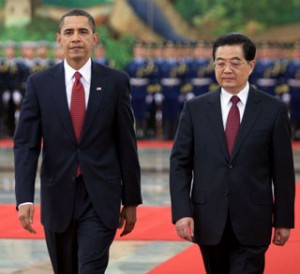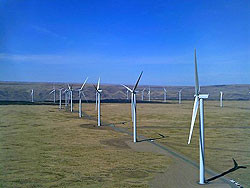The United States and China are the two largest consumers of energy in the world, and these countries require substantial investments in order to meet their energy needs. As China and the U.S. pursue similar goals, it makes sense for these big energy consumers to want to learn from each other. In 2012, Chinese direct investments into the U.S. totaled $6.7 billion, of which $2.965 billion went into the energy sector.
In 2009, President Obama and President Hu announced several clean energy initiatives during a Beijing summit, including the Electric Vehicles Initiative, Renewable Energy Partnership, and Shale Gas Resource Initiative. These projects demonstrated cooperation between the U.S. and China and affirmed a commitment towards low-carbon economies.
Most recently, the Chinese have shown interest in U.S. shale gas technology. China has vast shale gas reserves but lacks the expertise, technology, and resources to take advantage of them. Both countries have ambitious renewable energy goals, and the U.S. could create economic opportunities for both countries by sharing its expertise. Adopting U.S. technologies would allow China to phase out large portions of its coal energy, thus benefiting the climate as well. Similarly, cooperation will help expand market opportunities for clean energy companies.
Although Chinese investment into the U.S. energy sector could create many benefits and opportunities, it could also create several national security risks. Recently, the Committee on Foreign Investment in the United States (CFUIS) reviewed several cases in which foreign purchases of domestic energy companies created national security concerns.
Pending CFUIS approval, the China National Offshore Oil Company Ltd (CNOOC) sought to buy Canadian oil and gas company Nexen Inc for $15.1 billion. Nexen controlled oil in the Gulf of Mexico, the Long Lake oil sands project located in Alberta, and the world’s third-largest crude storehouse. CFUIS approved the sale, but due to the project’s proximity to strategic Department of Defense locations in the Gulf, CNOOC must adhere to a broad range of security measures.
CFUIS forced similar concessions in a deal between Wanxiang Group Co., China’s largest auto-parts maker, and a bankrupt electric-car battery company called A123 Systems, Inc. Wanxiang acquired A123’s automotive, grid, and commercial business assets for $256.6 million. The CFUIS would not allow Wanxiang to receive A123 government grants or purchase U.S. government contracts due to security concerns, so a U.S. firm called Navitas Systems LLC purchased these contracts instead.
 In a third case, CFUIS blocked the development of a wind project purchased by Chinese-owned Ralls Corp. from a Greek energy firm called Terna Energy. The wind project, located in Oregon, would connect turbines to a regional electrical grid located near a U.S. Navy facility. A Presidential order forced Ralls to divest all of its interests due to national security risks.
In a third case, CFUIS blocked the development of a wind project purchased by Chinese-owned Ralls Corp. from a Greek energy firm called Terna Energy. The wind project, located in Oregon, would connect turbines to a regional electrical grid located near a U.S. Navy facility. A Presidential order forced Ralls to divest all of its interests due to national security risks.
These examples demonstrate that while the projects comply with energy initiatives between the U.S. and China, they raise concerns about U.S. national security. China’s ability to infiltrate U.S. power systems, the transfer of key technologies to China, and the proximity of foreign-controlled projects to sensitive military facilities are several of the concerns that account for the CFUIS’s thorough review of recent Chinese purchases.
These concerns are not unfounded, as critical U.S. infrastructure and energy grids are vulnerable to cyber attacks, and China’s recent reputation for cyber espionage proves worrisome for future domestic investments.
In 2012, a report by the U.S. House Permanent Select Committee on Intelligence determined that investments by two Chinese telecommunications companies, Huawei and ZTE, could undermine core U.S. national interests. In a more recent report, a security company called Mandiant Corporation stated that China sponsors several cyber espionage groups capable of long-running and extensive campaigns due to direct government support. One of these groups, APT1, has stolen hundreds of terabytes of data from 141 organizations.
On the other hand, foreign investment and international cooperation in the energy sector are essential for a vibrant modern economy. The risks brought on by the rise of China require proper management. CFUIS is completing an important task by examining and reviewing foreign investments. Overall, Chinese direct investment can be beneficial to the U.S. with the proper oversight to protect national interests.


